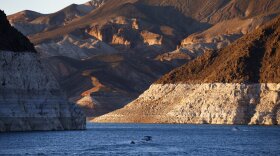The Colorado River is the lifeblood of the American Southwest, and it's no secret that it's under threat from increased demand and prolonged drought. However, what the seven states that rely on the river are going to do about it is still a mystery.
That's because the compact that dictates how much water each state can draw from the river will end next year, and current negotiations appear to be going nowhere. Now, new analysis suggests that another bad winter could spell disaster for the entire Colorado River Basin.
According to KUNC Public Radio's Colorado River Reporter, Alex Hager, the report's conclusions are dire.
"Water could drop too low behind the dam that holds back Lake Powell, allowing it to flow through the hydropower turbines that generate electricity for millions of people across seven states," Hager said. "And if it drops even lower than that, it could go too low to pass through the dam at all, meaning that the water that flows into Lake Mead, the water that supplies Las Vegas, Los Angeles and Phoenix, would not be coming in the quantity that those cities expect it to be coming."
Currently, officials representing each state and water district in the basin are in negotiations to determine the future of the Colorado River Compact, which governs the allocation of water from the river among jurisdictions. The current guidelines will expire in October 2026.
And while federal officials are considering potential cuts to the amount of water each state can draw from the river, it remains unclear exactly what will happen.
"The standing rules for managing water would revert to rules last written in the 1970s, when the water picture in the West looked a lot different," said Hager. "There was a lot more of it, and fewer people."
However, Hager said that most remain optimistic that negotiators can reach a deal before time runs out.
"There is a feeling that things could be resolved before the deadline, simply because many deals in the past have been forged in the eleventh hour," he said.
Guests: Alex Hager, Colorado River Reporter, KUNC










